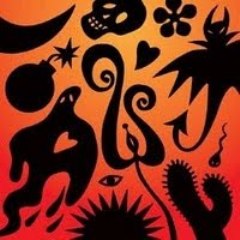Gustavo Cordera - La Caravana Magica (2010)
Gustavo Cordera - La Caravana Magica (2010)

01 - No es que sea viejo
02 - Es Real
03 - La Bomba Loca
04 - Huguito en Retirada
05 - Asalto de Cumbia
06 - El Capitalismo Se Cae play
07 - Iridiscencia play
08 - El lisiadito
09 - Acerca de La Muerte
10 - La Retirada
Gustavo Cordera, voz y guitarra Stella Céspedes, voz y percusión Lele Perdomo, guitarras eléctricas, acústicas y voz Chacho Píriz, guitarras acústicas y voz Schubert Rodríguez, teclados, acordeón y voz Licina Picón, voz y teclados Pepe Oreggioni, bajo, guitarra acústica, ukelele y voz Emiliano Pérez Saavedra, batería y percusión Soema Montenegro, coros y voz
Buenos Aires, Argentina. El pelado Cordera presenta en este 2010 su segundo trabajo como solista plasmando en él canciones con más tintes pachangueros matizadas con sus líricas directas e ingeniosas para narrar amoríos y existencialismos. La Caravana Mágica nos lleva a recorrer cumbia, milonga, folklor y pachanga.
Gustavo Edgardo Cordera (born 1964 in Lanús, Buenos Aires) is an Argentine rock musician, best known as the frontman of the band Bersuit Vergarabat.
Cordera's musical career began in 1988, when he was studying communications at the Universidad Nacional de Lomas de Zamora and running his own auto dealership, Cordera Bros. In the spring of that year, he visited Rio de Janeiro during Carnaval and was inspired to become a musician. Returning to Lanús, he sold his dealership, abandoned his studies, and shaved his head, an act which earned him the sobriquet Pelado ("Bald"). At la Casa de las Artes de la Vieja Avellaneda, a meeting place for musicians and artists, Cordera met keyboardist Juan Subirá and bassist Pepe Céspedes, and together they produced the songs "Masturbación en masa" ("Masturbation en masse") and "Hociquito de Ratón" ("Little Rat-Snout"). A year later, along with drummer Carlos Martín and guitarist Charly Bianco, they formed Bersuit, whose name was soon lengthened to Bersuit Vergarabat. During the early nineties they were joined by guitarist Oscar Righi, keyboardist Raúl Pagano, and vocalist Rubén Sabrinas. In 1992 they released the album Y Punto, and in 1993, Asquerosa Alegría. Both albums were well received.
The group's initial success was interrupted by internal changes, including the departure of Pagano, Sabrinas, and Bianco, and the arrival in 1995 of Alberto Verenzuela. The group's lack of activity gave rise to rumors of a break-up. "It was the most depressing moment of my life", said Cordera. Though lacking a distributor, the group began working on its third album, tentatively titled "La historia de Don Leopardo y Vir Trompzio" (eventually released in 1996 as Don Leopardo). Though it was a commercial failure, the band recovered in 1998 with Libertinaje, followed by Hijos del Culo (2000) and De la Cabeza (2002), the latter recorded live at the Estadio Obras. In 2004 they achieved great success with La Argentinidad al Palo. Their most recent release is Testosterona in 2005, whose track "Madre hay una sola" ("There is only one mother") reflects Cordera's environmentalism. On May 12, 2007, the band played at River Plate Stadium, in Buenos Aires, attended by over 60,000 people
download (mp3 @128 kbs):
yandex 4shared mega mediafire zalivalka cloudmailru oboom uplea
Zmieniony (Wtorek, 29 Wrzesień 2015 23:14)








